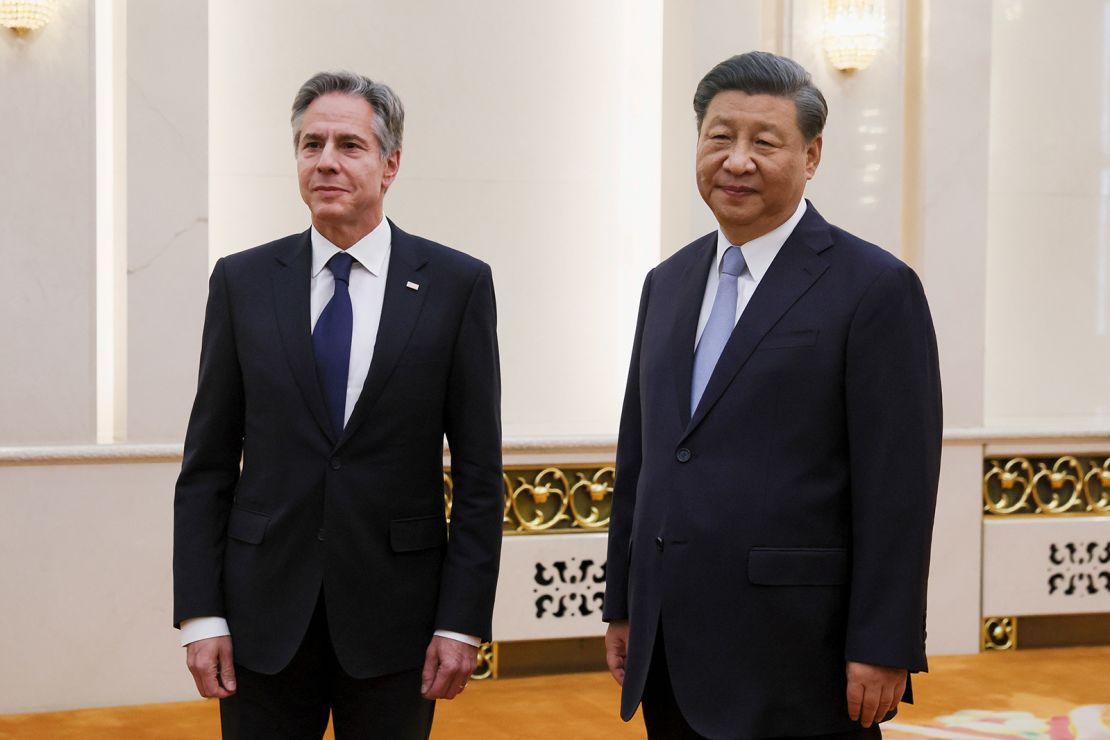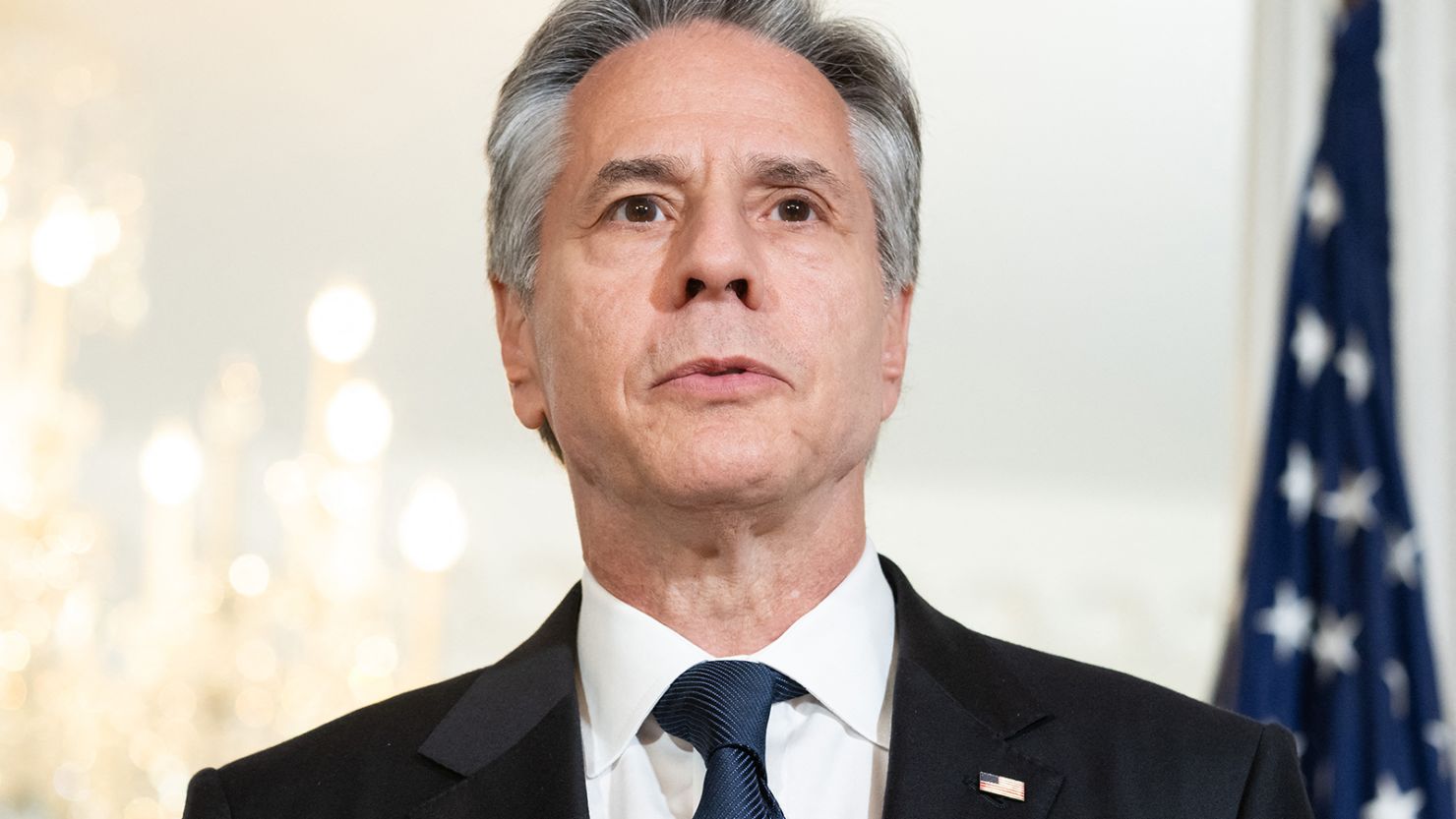US Secretary of State Antony Blinken arrived in China on Wednesday where he is expected to issue a strong warning to Chinese leaders about the country’s support for Russia’s efforts to ramp up weapons production as the war in Ukraine continues.
The top US diplomat landed in Shanghai where he is expected to meet local officials and business leaders, and he will then travel to Beijing for meetings with senior Chinese officials. The trip – his second to the country in less than a year – is the latest in a string of high-level engagements that culminated in a summit meeting between President Joe Biden and Chinese leader Xi Jinping in California in November following a period of immense tension.
Treasury Secretary Janet Yellen visited the country just weeks ago, and Biden and Xi spoke on the phone earlier this month.
“We are in a different place than we were a year ago when the bilateral relationship was at an historic low point,” a senior State Department official said.
Although officials from both nations suggested Blinken’s agenda will be focused on managing the relationship and communicating concerns, there are still sharp divides, and the conversations are not expected to be easy, especially on the issue of China’s support for Russia’s industrial base as the war in Ukraine continues.
The Biden administration has increasingly sounded the alarm about China’s support as Russia increases the pace of its weapon manufacturing efforts – support that the US says has allowed Moscow to continue its war against Ukraine.
“We see China sharing machine tools, semiconductors, other dual-use items that have helped Russia rebuild its defense industrial base that sanctions and export controls had done so much to degrade,” Blinken said at a press conference in Italy last week.
China has not provided direct military support to Russia, but the industrial and logistical help it is providing is having a significant impact, at a time Ukraine’s military has been plagued by equipment and weapon shortages.
As Russia has begun to build back its defense capabilities, the US has sought to rally allies to pressure Beijing – via diplomatic means or, if that fails, punitive measures – to stop providing the support, and Blinken is expected to deliver a robust message on the issue during his visit.
“Russia is no longer kind of on its back foot,” a second senior State Department official said. “They are surging. They have substantial assets, they reconstituted. They pose a threat not just to Ukraine but to the wider region.”
Blinken will make the case that support for Russia is undermining not just Ukraine, but all of European security.
“China can’t have it both ways,” Blinken said. “It can’t purport to want to have positive relations with Europe and at the same be fueling the biggest threat to Europe since the end of the Cold War.”
State Department spokesperson Matthew Miller said Monday that “we do think that there is more that China can do, and we have always made clear that we are willing and able to take our own actions if appropriate, and I think I’ll leave it at that.”
Despite the threat of US action, a Chinese Foreign Ministry official on Tuesday signaled that Beijing is unlikely to back down on its support for Moscow, warning the US against “smearing normal state-to-state relations” and calling for the US to lift sanctions on Chinese entities, during a state media briefing.
“The Ukrainian issue is not an issue between China and the United States, and the United States should not turn it into an issue between China and the United States,” the official was quoted as saying.

China’s grievances
Chinese officials are also expected to raise issues of concern with Blinken.
Grievances are mounting in Beijing towards what it sees as intensifying US efforts to contain and suppress China, despite the increased communications between the two countries following the Biden-Xi summit last November.
While US-China relations have stabilized since the summit, “the negative factors in the relationship are also very prominent,” the Chinese Foreign Ministry official said in Tuesday’s briefing.
“The United States is stubbornly advancing its strategy to contain China and continues to use wrong words and deeds that interfere in China’s internal affairs, smear China’s image, and harm China’s interests. We firmly oppose and counteract this,” the official said.
Still, the Biden administration is keen on keeping lines of communication open, and they believe that China is currently on the same page. China has come to the realization that their aggressive diplomacy was “profoundly unsuccessful” because it “alienated more than it attracted,” said the second senior State Department official, in explaining why China is now open to engagement.
“The Chinese want a more stable global environment, their economy has slowed substantially, they want more investment,” the official explained, adding that China wants engagement specifically from US businesses.
Other issues in the Indo-Pacific region are also expected to feature prominently in Blinken’s meetings.
The Biden administration has sought to shore up its alliances in the region in the face of “provocations” by Beijing in the South China Sea. In the past few weeks, Biden hosted his Philippine and Japanese counterparts for an inaugural summit in Washington, where he reaffirmed the US’ commitment to the Philippines’ defense. The US has deployed a powerful land-attack missile system to the Philippines and conducted a series of joint exercises with the treaty ally.
In Tuesday’s briefing, the Chinese Foreign Ministry official accused the US of “being obsessed with coercing its allies into forming an anti-China clique” and “interfering in the South China Sea and sowing discord between China and ASEAN,” referring to the Association of Southeast Asian Nations.
A sensitive time
Blinken’s visit also comes at a sensitive time in the Taiwan Strait, less than a month before the self-governing island of Taiwan swears in a new president Beijing openly loathes.
The first senior State Department official said that “you can expect that the Secretary will underscore both in private and public America’s abiding interest in maintaining peace and stability across the Taiwan Strait.”
“We think that is vitally important for the region and the world. And our expectation will be – particularly during this important and sensitive time leading up to the May 20 inauguration – that all countries will contribute to peace and stability, avoid taking provocative actions that may raise tensions, and demonstrate restraint. That will be our message going forward,” the official said.
China’s ruling Communist Party views Taiwan as part of its territory, despite having never controlled it. While successive Chinese Communist leaders have vowed to eventually achieve “reunification,” Xi has repeatedly said the Taiwan issue “should not be passed down generation after generation” and has significantly ramped up economic, military and diplomatic pressure against its democratic neighbor in recent years.
The Taiwan Relations Act obligates Washington to provide weaponry for the island’s defense, and Biden has repeatedly suggested he would use US military personnel to defend it in the event of a Chinese invasion (though White House officials have said the US policy to leave that question ambiguous has not changed).
The two sides are also expected to discuss the situation in the Middle East. US officials believe China has sway especially given how much oil it imports from Iran. Blinken will make the case that China should weigh in “more directly” with Iran to be less provocative in the region, the second senior State Department official said.
“I will let China speak to any actions that it has taken,” Miller said Monday. “But we will continue to press the case to China that it’s not just in the interests of the region, it’s not just in the interests of the United States, it’s not just in the interests of the individual countries that are involved, but it’s in the interests of China and the broader world that there not be a further widening of the conflict.”
Blinken is expected to discuss the flow of fentanyl precursor chemicals into the US and military-to-military dialogue, which are both areas where Xi made commitments when he met with Biden.
“In both cases the Chinese have taken some early steps,” said the second senior State Department official, adding that there is still “much more” that needs to be done on both fronts.
Blinken is also expected to raise concerns about China efforts to strengthen its nuclear arsenal as well as the cases of Americans who have been prevented from leaving China due to exit bans or those whom the State Department has deemed wrongfully detained, including Mark Swidan, Kai Li, and David Lin.








